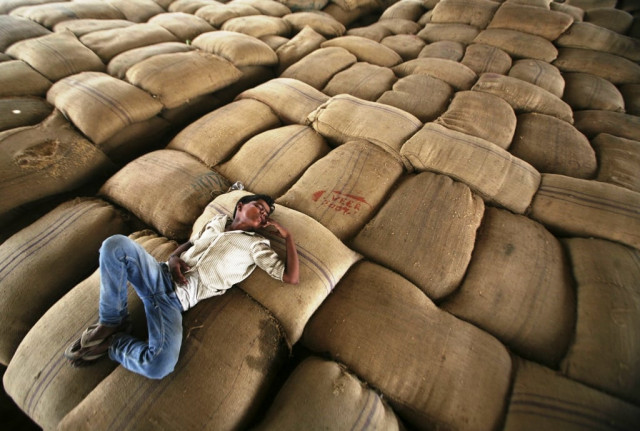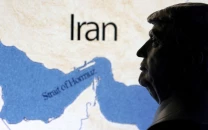As crops rot, millions go hungry in India
Lack of storage facilities and inefficient, corrupt public distribution system fails millions of impoverished people.

It is an extraordinary paradox created by a rigid regime of subsidies for grain farmers, a woeful lack of storage facilities and an inefficient, corruption-plagued public distribution system that fails millions of impoverished people.
And it is an embarrassment for the government led by the Congress party, which returned to power in 2009 thanks in large part to pledges of welfare for the poor, who make up about 40 percent of the 1.2 billion population.
Quite why the authorities could not simply offload the mountains of grain for free to fill empty stomachs is puzzling, but the explanation lies in the complex regulations that govern procurement and distribution.
"This is a case of criminal neglect by the government," said D. Raja, national secretary of the Communist Party of India, an opposition group. "The ruling party has been the worst manager of the demand-supply of food grains."
Officials say that, in all, about 6 million tonnes of grain worth at least $1.5 billion could perish. Analysts say the losses could be far higher because more than 19 million tones are now lying in the open, exposed to searing summer heat and monsoon rains.
Saddomajra, a village in the bread-basket state of Punjab, is one of the dumping grounds for the record stockpile of wheat that has accumulated after half a decade of bumper harvests in the world's second-largest producer of the grain.
Here there are thousands of sacks of decomposing wheat, occupying an area the size of a football field and towering in some places to the height of a house. Tarpaulins cover most of the mounds, but many of the bags are torn, spilling blackened grain blighted by fungus and insects.
"The wheat has been lying there for the past five years. It smells very bad," said Hakkam Singh, who works as a watchman at the open field. "Nobody steals it, but people use it to feed fish and poultry farms."
At another dump, on the outskirts of Punjab's Amritsar city, locals told Reuters that officials sometimes dip into the sacks of rotting grain to mix it with fresh wheat for distribution to the poor who hold ration cards.
Wheat Stocks At All-Time High
In India the government buys rice and wheat from farmers at a guaranteed price, a support system akin to the subsidies that led to Europe's notorious butter mountains and milk lakes.
The government has raised the price it pays to buy wheat by more than 70 percent since 2007, which only encourages more production. As a result, stocks are now at an all-time high of about 50 million tonnes, 12 times more than the official target.
"It's related to pure economic security for the farmers," said Purnima Menon, a research fellow at the International Food Policy Research Institute in New Delhi. "They make a safe choice of crops."
Rajiv Tandon, a senior adviser for health and nutrition at aid organisation Save the Children in India, said that to diversify the country's food basket farmers should be offered incentives to grow vegetables and other cash crops.
However, he said root-and-branch modernisation is needed. The farm sector was transformed by the introduction of high-yielding seeds, fertilisers and irrigation during the Green Revolution nearly half a century ago, ending a dependence on imports, but it has seen only incremental reform ever since. Storage is one of the biggest problems of all.
"For the last 25 years the storage capacity has not been upgraded at all," Tandon said. "Part of the grain is officially stored outside store houses, where the chance of rotting is high. There are often not enough sacks and tarpaulins, and sometimes it is dumped by a graveyard or cremation centre."
Grain stocks officially deemed as stored in government warehouses now stand at a record 82.4 million tonnes. However, that is about 20 million tonnes more than actual capacity, which means grain lying in the open is being passed off as stored".
Who Will Buy?
State-run Food Corp. of India (FCI), the main grain procurement agency, buys about one-third of total wheat output to run welfare programmes and keep stocks for emergency needs.
What to do with the rest is a conundrum for the government, which is reluctant to sell wheat for less than the inflated support price it paid to farmers because it would put further strain on an already hefty fiscal deficit.
Recently it offered 6 million tonnes of rice and wheat to state administrations for the poor at cheaper rates, in addition to 55 million already earmarked for financial year 2012/13. But there were not many takers because state governments are grappling with budget overruns themselves. Exporting wheat is not an attractive alternative.
After buying wheat from farmers and adding freight, storage and transport costs, the free on board (FOB) price is around $346 a tonne. However, Indian wheat would only be competitive in the export market at around $260, which implies a loss - effectively a further subsidy, and this time to consumers in other countries - of $85-90 per tonne for the government.
The brimming granaries forced India to lift a four-year-old ban on private exports last September, but lower global prices have scampered those plans.
Traders say that even if India went all-out to export wheat it could at best sell 6-7 million tonnes a year because of transport bottlenecks and doubts about the quality of the grain.
New Delhi is considering the export of up to 3 million tonnes of wheat to sanctions-hit Iran, but traders say Tehran will not be falling over itself to buy because of concern that Indian grain may be tainted by fungal disease.
Last month the government decided to offer 3 million tonnes of wheat to local biscuit makers and flour millers at $205 a tonne against the $225 it paid to farmers in 2012.
"Subsidising our bread and biscuit makers is easier than subsidising consumers of other countries," said a senior government official, who did not wish to be identified due to political criticism of a solution to the surplus that benefits private companies rather than the poor.
In China, a large portion of wheat stocks are channeled into the country's rapidly expanding animal feed sector, replacing more expensive corn. However, India has an exportable surplus of corn and its meat consumption is far lower, so there is little demand for wheat as a replacement for other grains.
"National Shame"
A government-supported survey published earlier this year found that 42 percent of India's children under 5 are underweight; almost double that of sub-Saharan Africa. The finding led Prime Minister Manmohan Singh to admit that malnutrition was "a national shame".
The cause of this widespread malnutrition cannot be tied mechanically to a lack of staples like rice and wheat.
Indeed, many families living on less than $2 a day are fuelled and filled by subsidised carbohydrate-rich food like wheat chapattis. These lack the much-needed protein and other nutrients that come in more expensive food. Poor hygiene and contaminated water are also to blame because they cause illnesses like diarrhoea, which prevents nutrient



















COMMENTS
Comments are moderated and generally will be posted if they are on-topic and not abusive.
For more information, please see our Comments FAQ